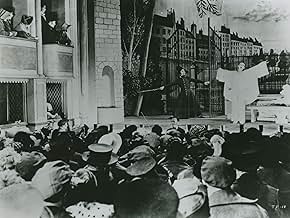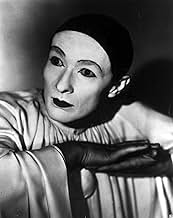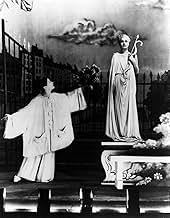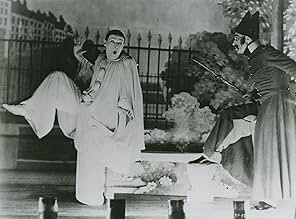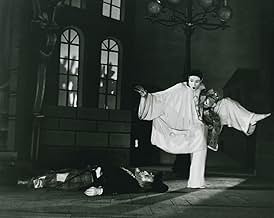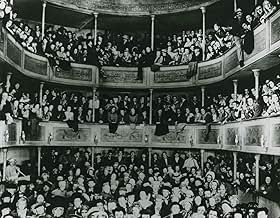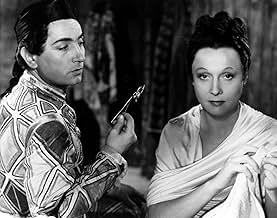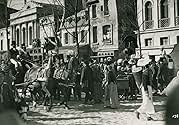CALIFICACIÓN DE IMDb
8.3/10
22 k
TU CALIFICACIÓN
La vida teatral de una bella cortesana y los cuatro hombres que la aman.La vida teatral de una bella cortesana y los cuatro hombres que la aman.La vida teatral de una bella cortesana y los cuatro hombres que la aman.
- Nominado a 1 premio Óscar
- 2 premios ganados y 1 nominación en total
María Casares
- Nathalie
- (as Maria Casarès)
Palau
- Le régisseur des Funambules
- (as Pierre Palau)
Etienne Decroux
- Anselme Debureau
- (as Étienne Decroux)
Jane Marken
- Mme Hermine
- (as Jeanne Marken)
Raymond Rognoni
- Le directeur du Grand Théâtre
- (as Rognoni)
- Dirección
- Guionista
- Todo el elenco y el equipo
- Producción, taquilla y más en IMDbPro
Opiniones destacadas
It is an epic. One of the best films ever made. The script and the dialogues show that the genius of Jacques Prévert wasn't made only for written poetry but for poetry in motion as well.Carné's camera is precise and makes one feel like a real witness of the plot. All in all a lesson of how to make a film yesterday, today and tomorrow.
10geroldf
*Enfants* is a work of genius. I won't say it's the greatest film of all time, because its scope is very narrow: the mystery of the heart, the wayward course of love, the bittersweet joy and sorrow of lovers. Maybe that isn't so narrow after all, but it doesn't cover quite as wide a spectrum as other great films (seven samurai, casablanca, mahabharata, key largo etc). Nonetheless, this film belongs in that same company, for an unsurpassed portrayal of loves lost and won, and also the passion of art, a form of love expressing itself in public creativity, enriching the lives of many. Love between lovers enriches them alone; art enriches the world.
The woman Garance is loved by 4 men in this film. Two of them, at least, are superb renditions of genius-in-creation: the mime Baptiste, and the actor Frederick. Both are geniuses, but while Baptiste is silent, weak, and sad, Frederick is loud, powerful, irrepressively optimistic, courageous and generous. He is one of the greatest characters ever to grace the screen. He has one flaw: his genius is so pure, he has a blind spot regarding the weaknesses of others. He cannot conceive of an emotion such as jealousy, and so can never play Iago - until Garance, the fallen woman, finally teaches him.
The other character who may be a genius is Lacenaire, but he is a criminal genius. Evil, twisted, burning with hatred, he has only one true and honest anchor in society - his love for Garance. It doesn't save him, but it keeps him from being as bad as he could be.
Without going into the whole plot (it's long and convoluted) the primary paradox relates to intersecting and disconnected paths of love between the characters. Garance is loved by 4 men, but she really only loves Baptiste. So does Nathalie, a sweet and simple girl, who has the courage to do what Baptiste can not: she declares her love, and so they marry and have a child. Baptiste lacks the strength to take Garance when he has the chance, and so no one is happy - except maybe Frederick, he lives as life should be lived, and even the pain of losing Garance turns to gold in the alchemy of his art.
But despite the pain, and the unhappiness, loss and death, the world of *enfants* is beautiful. It's a world where love and art mean more than success or failure, a world where money is irrelevant and the passion for life burns away the curtain between fantasy and reality. It's three hours of *paradis*!
10/10, with a bullet through the heart.
The woman Garance is loved by 4 men in this film. Two of them, at least, are superb renditions of genius-in-creation: the mime Baptiste, and the actor Frederick. Both are geniuses, but while Baptiste is silent, weak, and sad, Frederick is loud, powerful, irrepressively optimistic, courageous and generous. He is one of the greatest characters ever to grace the screen. He has one flaw: his genius is so pure, he has a blind spot regarding the weaknesses of others. He cannot conceive of an emotion such as jealousy, and so can never play Iago - until Garance, the fallen woman, finally teaches him.
The other character who may be a genius is Lacenaire, but he is a criminal genius. Evil, twisted, burning with hatred, he has only one true and honest anchor in society - his love for Garance. It doesn't save him, but it keeps him from being as bad as he could be.
Without going into the whole plot (it's long and convoluted) the primary paradox relates to intersecting and disconnected paths of love between the characters. Garance is loved by 4 men, but she really only loves Baptiste. So does Nathalie, a sweet and simple girl, who has the courage to do what Baptiste can not: she declares her love, and so they marry and have a child. Baptiste lacks the strength to take Garance when he has the chance, and so no one is happy - except maybe Frederick, he lives as life should be lived, and even the pain of losing Garance turns to gold in the alchemy of his art.
But despite the pain, and the unhappiness, loss and death, the world of *enfants* is beautiful. It's a world where love and art mean more than success or failure, a world where money is irrelevant and the passion for life burns away the curtain between fantasy and reality. It's three hours of *paradis*!
10/10, with a bullet through the heart.
it takes a real poet to write dialog this incisive, not that i speak french, but the new subtitles are very clear (visually) and concise (linguistically)... the poet was jacques prevert, the director marcel carne, and if you want to know how powerful real moviemaking can be, you have to see this picture... as in all true tragedy, the various pairs of lovers comment by their actions on each other's destinies... baptiste/garance are the main pair we care most about, but all the others contribute to and contrast with their true, genuine, doomed affair... the shadows of the main pair are baptiste/nathalie, and garance/frederick, descending to the sick depths of garance/edouard, lacenaire/avril, and jericho/himself. it's like a deck of cards with all possible combinations revealed. based on a true story, set against the theatre milieu of the 1840s, this has the world's best crowd scenes, partially because carne employed every actor in france who needed saving from the nazis, including hiding jews on the set (it was made during WWII). the use of mime advances the plot and is not simply an excuse for baptiste to show off his real-life talents (jean-louis barrault conducts a school of mime in france to this day.) the stunningly vibrant arletty plays garance, a whore with a heart, as if such a thing had never happened before... and until she did it her way, it hadn't...
It's one of the best films ever made and one of my favourite films, although the first time I attempted to see it at 14 years old in 1973 I didn't understand it at all. I tried again four years older and it won me over. Personal tastes vary not only between people but within people over time. Nowadays I can't understand why some people can't understand it and get nothing from this timeless world classic - at the very least they could look upon it as the closest the French cinema ever got to Dickens.
Meandering tale set in 1840's France has whimsically smiling Garance played by Arletty in love with mime artist Baptiste played perfectly by Jean-Louis Barrault but with three other men in love with her too. These are the Dramatic Actor Lemaitre played by Pierre Brasseur (Lucien from Le Quai Des Brumes), the cynically corrupt Lacenaire by Marcel Herrond (Renaud from Les Visiteurs Du Soir) and stiffly possessive Montray by Louis Salou. With Maria Casares as the faithful Nathalie the trouper in love with Baptiste and you have the main cast for your delectation. Just as the characters in the plays at the Funambules depended upon the pleasure of the audience up in "the Gods" so do the actors on the screen – although now thanks to TV and DVD us people up in the Gods are a lot more distant! The main thread is how and why all the tangled love affairs unravel. The film is littered with eccentric characters and heavy poetic observations, backed up with a logical plot, incredible sets and unforgettable acting – all made under the Nazi occupation. Adversity often heightens the senses, but Carne and Prevert excelled themselves with this production. Favourite bits: Baptiste proving Garrance's innocence of stealing a watch in mime to the assembled crowd; the touchy scenes inside the aptly-named Robin Redbreast pub; Garance and Lemaitre in the deeply shaded box at the Funambules watching Baptiste perform; his calling her beautiful and her response of "No, just alive, that's all"; Lemaitre revising the play in which he was acting on the stage; his opinion of mulled wine – "Like God slipping down your throat in red velvet breeches"; Lacenaire's lacerated opinion of everything – especially of Montray; the bookend bustling street scenes at the start and finish; the astounding ending; and on and on – so much richness to see and hear in three hours!
It's a world portrayed in great detail and lovingly, done in the best French tradition: dreamy, full of poetry, a frisson of sex and a little violence. As with me, it may need a little patience to cultivate this particular flower, but if you allow it into your heart it will never leave you again. Definitely High Art!
Meandering tale set in 1840's France has whimsically smiling Garance played by Arletty in love with mime artist Baptiste played perfectly by Jean-Louis Barrault but with three other men in love with her too. These are the Dramatic Actor Lemaitre played by Pierre Brasseur (Lucien from Le Quai Des Brumes), the cynically corrupt Lacenaire by Marcel Herrond (Renaud from Les Visiteurs Du Soir) and stiffly possessive Montray by Louis Salou. With Maria Casares as the faithful Nathalie the trouper in love with Baptiste and you have the main cast for your delectation. Just as the characters in the plays at the Funambules depended upon the pleasure of the audience up in "the Gods" so do the actors on the screen – although now thanks to TV and DVD us people up in the Gods are a lot more distant! The main thread is how and why all the tangled love affairs unravel. The film is littered with eccentric characters and heavy poetic observations, backed up with a logical plot, incredible sets and unforgettable acting – all made under the Nazi occupation. Adversity often heightens the senses, but Carne and Prevert excelled themselves with this production. Favourite bits: Baptiste proving Garrance's innocence of stealing a watch in mime to the assembled crowd; the touchy scenes inside the aptly-named Robin Redbreast pub; Garance and Lemaitre in the deeply shaded box at the Funambules watching Baptiste perform; his calling her beautiful and her response of "No, just alive, that's all"; Lemaitre revising the play in which he was acting on the stage; his opinion of mulled wine – "Like God slipping down your throat in red velvet breeches"; Lacenaire's lacerated opinion of everything – especially of Montray; the bookend bustling street scenes at the start and finish; the astounding ending; and on and on – so much richness to see and hear in three hours!
It's a world portrayed in great detail and lovingly, done in the best French tradition: dreamy, full of poetry, a frisson of sex and a little violence. As with me, it may need a little patience to cultivate this particular flower, but if you allow it into your heart it will never leave you again. Definitely High Art!
One day in 1966 I was walking along 8th Street in the Village. The Village was where I went when I had no where else to go, when I belonged no where, where I thought I could discover myself. It didn't hurt that there were people to stare at, without being too obvious about it.
It was a gray day and it started to rain. I stopped under the first protection I found, a movie marque - neither handsome nor attractive.
The photos promoting the film were behind glass at odd angles, held by tacks. I just wasn't in the mood. It wasn't what I was looking for. But the rain got worse, and I needed warmth. So I bought my ticket to join the twenty or so people who comprised the full audience.
From its first moment, the film pulled me in. After a frenetic start, it quieted to Jean-Louis Barrault sitting alone on a barrel. I'd seen Marceau before, but not until now had I seen the quiet poetry of true mime.
Barrault's character, Baptiste, had silently observed the theft of a watch. Baptiste pantomimed the theft but staged his pantomime as if people's perceptions were a mistake, as if the theft never took place. In the doing, he made everyone laugh. He did this for the love of Garance, played by Arletty, whom he had seen for the first time.
There follows in the film first love - unrequited, poetic, soulful. We see villainy, melodrama, danger, heroism, satire, plays within plays - a host of stories all integral to the whole of the play. And we believe completely.
It is the most complete film ever made. It changed my life.
It was a gray day and it started to rain. I stopped under the first protection I found, a movie marque - neither handsome nor attractive.
The photos promoting the film were behind glass at odd angles, held by tacks. I just wasn't in the mood. It wasn't what I was looking for. But the rain got worse, and I needed warmth. So I bought my ticket to join the twenty or so people who comprised the full audience.
From its first moment, the film pulled me in. After a frenetic start, it quieted to Jean-Louis Barrault sitting alone on a barrel. I'd seen Marceau before, but not until now had I seen the quiet poetry of true mime.
Barrault's character, Baptiste, had silently observed the theft of a watch. Baptiste pantomimed the theft but staged his pantomime as if people's perceptions were a mistake, as if the theft never took place. In the doing, he made everyone laugh. He did this for the love of Garance, played by Arletty, whom he had seen for the first time.
There follows in the film first love - unrequited, poetic, soulful. We see villainy, melodrama, danger, heroism, satire, plays within plays - a host of stories all integral to the whole of the play. And we believe completely.
It is the most complete film ever made. It changed my life.
¿Sabías que…?
- TriviaFilming was completed a short time before D-Day and the director, having planned to distribute the film after the liberation of France, had three copies printed and concealed in three different places: a cellar of the Banque de France, a strongbox of Pathé and a Provence country house.
- ErroresIn the outdoor market scene, the amount of food laid out on the tables varies from shot to shot. The reason is that the extras were famished from years of wartime food rationing, and stole food whenever they were not closely watched.
- Citas
Frederick: Words and phrases leave you cold. You tell your story without speaking. And you do it so well. You really astonished me. Your legs speak, your hands answer. A glance, a shrug, a step forward, back and they understand up in the Gods.
Baptiste: They understand, though they are poor. I'm like them. I love them, I know them. Their lives are small, but their dreams are vast.
- Versiones alternativasThere are various alternate cuts of this film; the complete version runs 195 minutes and has been restored on video.
- ConexionesEdited into Il était une fois...: Les enfants du paradis (2009)
Selecciones populares
Inicia sesión para calificar y agrega a la lista de videos para obtener recomendaciones personalizadas
- How long is Children of Paradise?Con tecnología de Alexa
Detalles
Taquilla
- Presupuesto
- FRF 58,000,000 (estimado)
- Total en EE. UU. y Canadá
- USD 36,986
- Fin de semana de estreno en EE. UU. y Canadá
- USD 10,741
- 11 mar 2012
- Total a nivel mundial
- USD 44,906
- Tiempo de ejecución3 horas 9 minutos
- Color
- Mezcla de sonido
- Relación de aspecto
- 1.37 : 1
Contribuir a esta página
Sugiere una edición o agrega el contenido que falta

Principales brechas de datos
By what name was Los hijos del paraíso (1945) officially released in India in Hindi?
Responda


